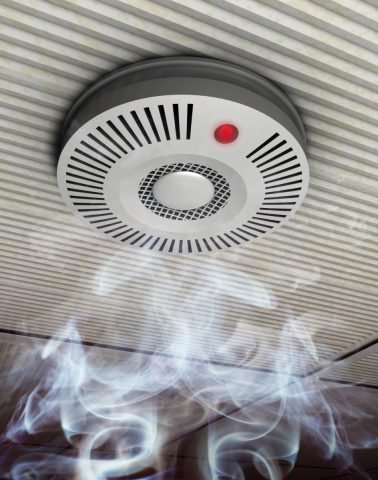With new landlord laws being introduced every few months, it’s easy for landlords to forget or overlook some of the legal requirements. So here are some of the most important rules and tips on how to avoid accidentally breaking them.
Have an annual gas safety check – This is top of the list, not only because it’s a legal requirement but, more importantly, it could save your tenants’ lives. Every gas burning appliance, including boilers and hobs, must be checked at least once a year by a Gas Safe-registered engineer and any faults repaired before the appliance is used again.
If you don’t, you are potentially risking your tenants’ lives and a fine of up to £20,000. Repeat offenders, or those who are found to have endangered their tenants, could be given a prison sentence. Also, landlords who haven’t got a valid gas safety record can’t evict their tenants.
How to avoid breaking the law – Tie a knot in a hanky as a reminder, or, better still, sign up to gassaferegister.co.uk for an email reminder when your annual check is due. The website also provides contact details for registered engineers.
The gas engineer will issue you with two copies of the Gas Safety Record: one for you and one for the tenant. You must keep your copy for two years and the other must be shown to existing tenants within 28 days of the check. New tenants must be given a copy when they move in.
Install smoke alarms – These became mandatory in rental properties from October 2015. Since then, it has been a legal requirement to have at least one working smoke alarm on every floor of a rental property. Landlords with solid fuel burning appliances must also install carbon monoxide alarms.
If you don’t, there’s a greater risk of your tenant being injured in the event of a fire or a carbon monoxide leak, and you face a fine of up to £5,000.
How to avoid breaking the law – Check alarms are working at the start of each tenancy and have this noted on the inventory. Also, you should insert a clause into the tenancy agreement to state that it’s the tenant’s responsibility to ensure the alarms are kept clear of dust and to replace spent batteries.

Landlord Rules You Must Not Break
Protect your tenant’s deposit – You need to register the deposit with one of three Government-approved schemes, which is pretty straightforward. However, many landlords don’t realise that you must also give the tenant specific information about where and how their deposit is protected, plus information on what they must do to get a refund at the end of their tenancy. You must also cite the reasons why they might forfeit some or all of their deposit.
If you don’t, your tenant could take you to court and you might be ordered to compensate them up to three times the value of the deposit. Also, you can’t issue a section 21 notice to end a tenancy unless you have correctly protected the deposit, including issuing the tenant with the prescribed information.
How to avoid breaking the law- Make sure you download the prescribed information forms from the scheme’s website, fill these in (carefully) and send them to your tenant. Make sure you have double-checked that all the information is correct, because if there is an error, you could still be prosecuted.
Ask your tenants to sign a form to say they have received all the information and keep copies for your own records.
Check your tenant’s Right to Rent – Immigration checks on tenants have been obligatory for landlords since February 2016. This means you must check that every tenant has the right to live in the UK before granting them a tenancy.
If you don’t, you could be fined up to £3,000, and repeat offenders face the prospect of a prison sentence.
How to avoid breaking the law – You must check the right to rent of every adult who will be living in the property, even if they are not named on the tenancy agreement and even if they appear to be British or a member of another European Union state.
You should check their photo ID and, if they’re not a British, EU or Swiss citizen, you will need to check that they have a valid visa, a certificate or a permit to remain in the UK. A list of acceptable ID is available from the Home Office.
The law requires you to check the ID in the tenant’s presence and to take a copy, which you must keep for a year after the end of the tenancy. Visas must be checked within 28 days of the start of the tenancy.
In order to comply with Data Protection Laws, you must keep the ID safe and tell the tenant if you need to send it to the Home Office for verification.
Further information, including how to verify a visa, is available from the Home Office.
End a tenancy the right way – This is no longer as easy as writing a note to a tenant to tell them you’d like them to leave. You must issue what’s known as a section 21 notice (or section 8 if the tenant has done something wrong and they’re still within the fixed period of their tenancy agreement). You must issue a section 21, even if the contract is due to expire, otherwise the tenant is entitled to stay.
If you don’t, the tenant has the legal right to stay living in your property until notice is correctly served.
How to avoid breaking the law – Remember, you can’t issue a section 21 during the first four months of a tenancy – you must give the tenant at least two months’ notice (allowing three to four days for the notice to arrive if you are sending it by post) and the notice period can’t expire during the fixed period of the tenancy agreement.
Also, you can only serve a section 21 notice if you have given the tenant a valid Gas Safety Record, an EPC for the property, a copy of the Government-issued How to Rent guide and you have protected their deposit.
If you’d like to know more about the new landlord regulations, Upad and Direct Line for Business are running a free webinar Thursday 1st September at 7.30pm – Register here.









